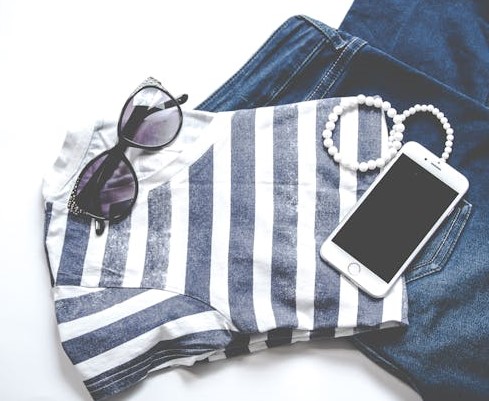In this lesson, we will focus on women’s favorite leisure activity: shopping. We will learn how to say clothes in German and useful verbs for shopping. After this lesson, you will be able to shop confidently in Germany. The lesson will cover vocabulary for clothes and shoes for both men and women, as well as explanations of words like “gefallen” and “finden.” Additionally, we will practice basic conversations on how to ask for certain things, such as the size, fitting room, and cash desk.
Thank you for reading this post, don't forget to subscribe!CONTENTS
Clothing. What is this?
Gefallen or gefällt
Finden
Nominative and Accusative
At the department store
Fitting room
Size
Phrases/ Redemittel
Compound words
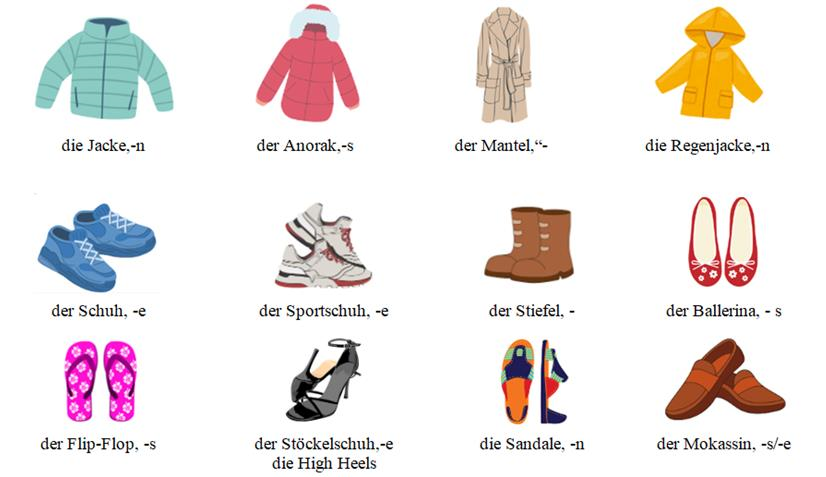
Clothing. What is this?/ Kleidung. Was ist das?
das T-Shirt,-s – T-shirt
das Hemd,-en – shirt
die Bluse,-n – blouse
die Hose,-n – trousers
die Jeans,- – jeans
der Rock,“-e – skirt
das Kleid,-er – dress
der Pullover,- – sweater
der Mantel,“- – coat
die Socke,-n – socks
die Schuhe – shoes
die Tasche,-n – bag
die Schorts (Pl.) – shorts
das Sakko, -s – jacket
Click on:
Grammar / Contents
Was ist das?
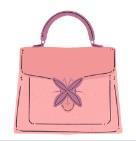 Das ist eine Tasche. Die Tasche ist modern.
Das ist eine Tasche. Die Tasche ist modern.
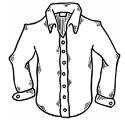 Das ist ein Hemd. Das Hemd ist hässlich.
Das ist ein Hemd. Das Hemd ist hässlich.
 Das ist ein Pullover. Der Pullover ist altmodisch.
Das ist ein Pullover. Der Pullover ist altmodisch.
If you want to remind yourself how the definite article and the indefinite article work in German, you can click here.
Gefallen oder gefällt/ To like
The verb gefallen is specific. It requires the dative case. The dative case refers to a person, while the nominative case refers to things we like.
For example:
NOMINATIVE + gefallen + DATIVE
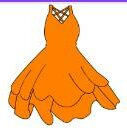 Das Kleid gefällt mir gut. Es ist elegant.
Das Kleid gefällt mir gut. Es ist elegant.
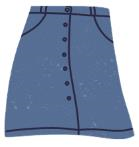 Der Rock gefällt ihr nicht so gut. Er ist altmodisch.
Der Rock gefällt ihr nicht so gut. Er ist altmodisch.
 Die Schuhe gefallen ihm gut. Er findet sie toll.
Die Schuhe gefallen ihm gut. Er findet sie toll.
And it can be like this:
DATIVE + gefallen + NOMINATIVE
 Mir gefällt die Tasche gut. Sie ist schick.
Mir gefällt die Tasche gut. Sie ist schick.
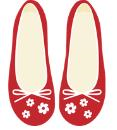 Meiner Schwester gefallen die Ballerinas nicht so gut.
Meiner Schwester gefallen die Ballerinas nicht so gut.
When do we use gefallen, and when do we use gefällt?
We need to pay attention to the things we like. If there are more of them, for example, if they are plural like ballet flats, then we use gefallen.
For example:
Die Ballerinas gefallen mir.
Die Taschen gefallen mir.
If there is only one thing, if it is singular, then we use gefällt.
For example:
Die Tasche gefällt mir.
Das Hoodie gefällt mir.
Wie gefällt dir/ Ihnen ….
- Mia, wie gefällt dir die Hose?
- Hm, nicht so. Aber die Jacke gefällt mir gut.
- Doch, sie sind cool.
- Der Mantel steht Ihnen großartig. Wie gefällt Ihnen der Mantel?
- Danke, das denke ich auch. Aber mir gefallen die langen Mäntel viel besser.
- Gefallen dir die blaue Schuhe nicht?
Finden/ To think
Glagol finden ima osnovno značenje: naći.Ali vrlo često se upotrebljava u nemačkom u značenju: Misliti o nekome/ nečemu dobro ili loše, smatrati nekoga ili nešto…. Da vidimo kako to zvuči u primerima.
The verb finden has the basic meaning: to find. But it is very often used in German in the meaning: To think about someone/something good or bad, to consider someone or something…. Let’s see how it sounds in examples.
For example:
Wie finden Sie den Mantel? – Ich finde den Mantel schick. (What do you think of the coat? – I think the coat is chic.
Wie findest du die Jacke? – Die Jacke finde ich langweilig. (What do you think of the jacket? – I find the jacket boring.)
More examples like these:
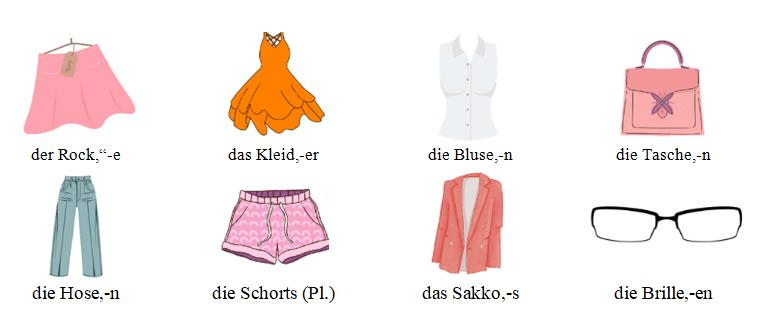
Die Hose finde ich interessant.
Die Schorts finde ich cool.
Ich finde das Sakko praktisch.
I will list useful adjectives that you can use with clothes in German, but also for shoes.
angenehm – pleasent ▪ modern – modern ▪ bequem – comfortable ▪ interessant – intresting ▪ cool – cool ▪ langweilig – boring ▪ altmodisch – old-fashioned ▪ unbequem – uncomfortable ▪ schick – chic ▪ elegant – elegant ▪ schön – beautiful
Colours/ Farben
bunt – colourful ▪ rot – red ▪ dunkelrot – dark red ▪ blau – blue ▪ hellblau – light blue ▪ gelb – yellow ▪ grün – green ▪ praktisch – practical ▪ hässlig – ugly
Nominative and Accusative/ Nominativ und Akkusativ
This is a weak adjective declension. The ending for the nominative singular for all three genders is -e, for the plural -en.
The ending for the accusative singular for the neuter and feminine genders is -e, in the plural -en. The masculine gender in the accusative case is an exception, both the article and the adjective have the ending –en.
| Nominative | Accusative |
| Die blaue Bluse gefällt mir gut. Das rote Kleid ist cool. Der gelbe Mantel ist elegant. Die schwarzen Schuhe sind bequem. | Ich finde die rote Bluse besser. Ich nehme das rote Kleid. Ich möchte den blauen Mantel. Ich nehme die schwarzen Schuhe. |
Im Kaufhaus/ At the department store
V= Verkäuferin – shop assistant
K = Kunde (Customer) / Kundin ( Female Customer)
Verkäuferin: Guten Tag, kann ich Ihnen helfen?
Kundin: Ja, gern. Ich suche einen Rock.
V: Röcke haben wir hier. Wie finden Sie den karierten Rock?
K: Der ist nicht schlecht, den nehme ich. Haben Sie auch Blusen?
V: Ja, hier. Die roten Blusen sind im Angebot.
K: Dann nehme ich die rote Bluse und den karierten Mantel.
Redemittel / Phrases
Kann ich Ihnen helfen? – Can I help you?
Ich suche… – I am looking for …
Den nehme ich. – I’ll take that one.
Die roten Blusen sind im Angebot. – The red blouses are on sale.
der karierte Rock – he chequered skirt
Umkleidekabine/ Fitting room
Kunde: Können Sie mir helfen?
Verkäuferin: Ja, gern. Was suchen Sie?
K: Ich suche ein Hemd und eine Hose.
V: Wie finden Sie das grüne Hemd?
K: Super, das gefällt mir gut, das nehme ich.
V: Hosen sind hier.
K: Kann ich die schwarze Hose anprobieren?
V: Ja, natürlich. Die Umkleidekabine ist dort links.
K: Ja, die Hose ist gut. Die nehme ich auch.
Redemittel / Fraze
Können Sie mir helfen? – Can I help you?
Kann ich … anprobieren? – Can I try …. on?
Die Umkleidekabine ist dort links. – The changing room is there on the left.
Größe/ Size
V: Kann ich Ihnen helfen?
K: Ja, haben Sie diese Schuhe auch in Schwarz?
V: Nein, tut mir leid, nur in Blau. Möchten Sie die blauen Schuhe anporbieren?
K: Okay. Die Schuhe sind aber zu klein. Haben Sie die auch in 39?
V: Ja, hier sind die Schuhe in Größe 39.
K: Und, gefallen sie Ihnen?
V: Ja, die Schuhe in 39 sind gut, die nehme ich. Wo ist die Kasse?
K: Die Kasse ist im Erdgeschoss.
Redemittel / Fraze
Haben
Sie diese Schuhe auch in Schwarz? – Do you also have these shoes in black?
Möchten Sie ……… anporbieren? – Would you like to try on ………?
Die Schuhe sind aber zu klein. – The shoes are too small.
Die Bluse ist aber zu groß/ zu eng / zu weit. – The blouse is too big/too tight/too wide.
Der Rock ist zu kurz/ lang. – The skirt is too short/long.
Haben Sie die Schuhe in Größe 39? – Do you have the shoes in size 39?
Wo ist die Kasse/ die Umkleidkabine? – Where is the checkout/ fitting room?
Die Kasse ist im Erdgeschoss. – The cash desk is on the ground floor.
Die Kasse ist im zweiten Stock. – The cash desk is on the second floor.
Compound words/ Komposita
Germans love compound words. I will give you a couple of examples. When we combine two nouns in a compound word, the gender is determined according to the last noun. In some compound words, we have to use conjunctions, as in the first and second examples -n- and -en-.
Examples:
die Dame + die Kleidung = die Damenkleidung
der Herr + die Kleidung = die Herrenkleidung
das Leder + die Jacke = die Lederjacke
See more:

